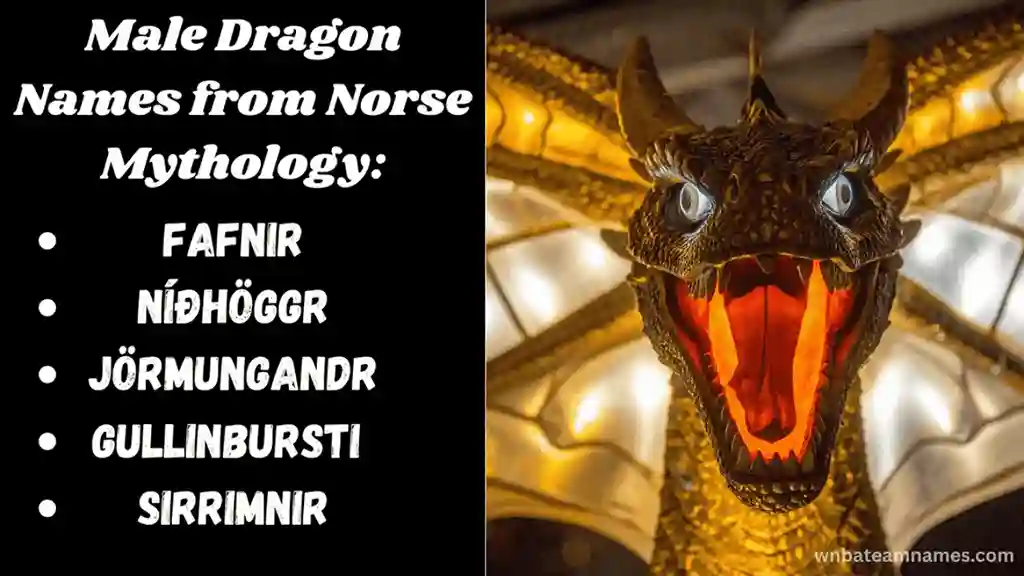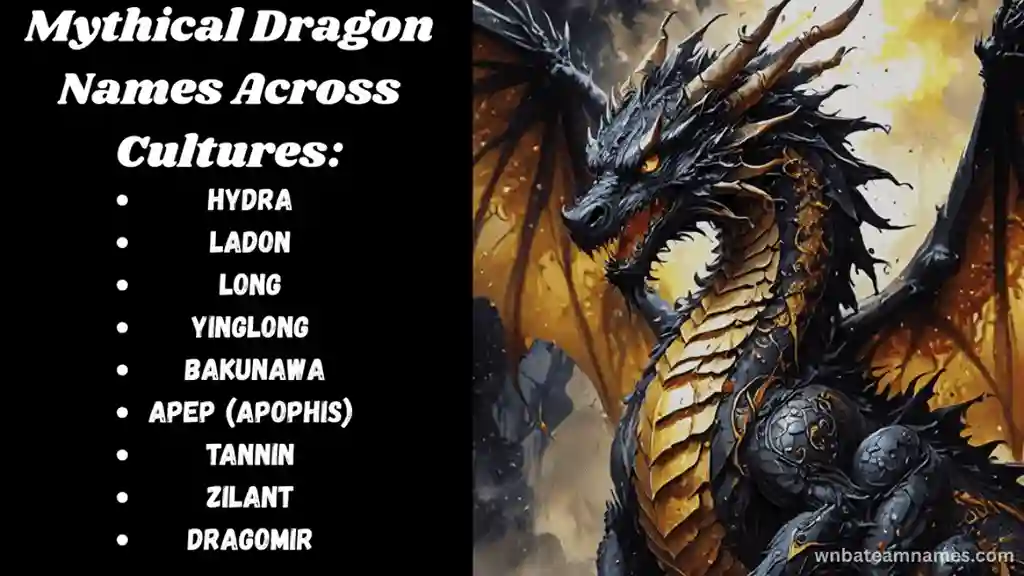
Why Dragon Names Still Fascinate Us Today?
Dragons have been at the heart of myths and legends for centuries, and the names of dragons are just as powerful as the creatures themselves. From ancient dragon names whispered in Babylonian stories to norse dragon names carved into Viking lore, every dragon name carries mystery, strength, and symbolism. Whether you’re into male dragon names, dragon names female, or simply exploring unique dragon names, there’s a reason why these legendary titles still capture our imagination.
What makes mythical dragon names so fascinating is the meaning behind them. Many named dragons in mythology symbolize chaos, wisdom, or protection, while others represent destruction and divine power. Exploring dragon names and meanings, from angelic names for dragons to famous mythical dragons, gives us a glimpse into cultural beliefs and epic tales. These mythology dragons names aren’t just words—they’re timeless symbols of power, making the search for the perfect name for a dragon as thrilling today as it was in ancient times.
Best Ancient Dragon Names and Their Meanings
Dragons have always been more than just fire-breathing beasts in stories — their ancient dragon names reflect entire cultures, myths, and beliefs. Across civilizations, the names of mythical dragons carried deep meaning, whether tied to chaos, wisdom, destruction, or divine guardianship. From norse dragon names in Viking sagas to dragon names in mythology across Babylon, Greece, and Asia, every dragon name tells a story that’s bigger than the creature itself. That’s why exploring dragon names and meanings is like unlocking hidden legends of the past.
- Tiamat – Babylonian goddess of chaos, often called the mother of dragons.
- Fafnir – A cursed Norse dwarf who became one of the most feared dragons in myth.
- Ryūjin – Japanese sea dragon god, ruler of the underwater palace.
- Quetzalcoatl – Aztec feathered serpent deity, blending divine power with dragon-like form.
- Leviathan – Biblical sea monster, a famous mythical dragon symbolizing untamed destruction.
- Apep (Apophis) – Egyptian serpent-dragon who fought Ra each night in the underworld.
- Hydra – Greek multi-headed dragon whose heads grew back when cut, a true symbol of immortality.
- Jörmungandr – The Norse World Serpent, destined to battle Thor at Ragnarok.
- Zmey Gorynych – Slavic three-headed dragon, fierce, fire-breathing, and feared in legends.
- Ladon – Greek dragon who guarded the golden apples in the Garden of the Hesperides.
The magic of these mythology dragons names lies in how they still inspire today’s books, games, and movies. Whether you’re searching for male dragon names, dragon names female, or even angelic names for dragons, the best choices are always rooted in culture and meaning. Remember, a dragon mythical name isn’t just a label — it’s a story, a symbol, and a piece of history that makes your name for a dragon truly unforgettable.
Famous Dragon Names in Mythology
Dragons have always ruled legends across cultures, sparking fear and respect at the same time. From fire-breathing beasts to wise guardians, their names still echo in stories worldwide.
- Smaug – the greedy dragon from Tolkien’s The Hobbit, symbol of destructive desire.
- Fafnir – from Norse myths, once a man turned dragon because of greed.
- Quetzalcoatl – feathered serpent from Aztec mythology, a mix of wisdom and divinity.
- Shenlong – Chinese dragon controlling rain and storms, tied to prosperity.
- Yamata no Orochi – Japanese eight-headed dragon, defeated by the storm god Susanoo.
- Tiamat – Mesopotamian chaos dragon, mother of monsters in Babylonian legends.
These legendary dragon names aren’t just fantasy—they reveal human fears, desires, and the timeless clash of chaos and order. Each culture gave them roles that shaped myths, proving dragons are more than monsters. They’re mirrors of humanity, teaching lessons about greed, wisdom, and power.
Unique Dragon Names with Powerful Origins
Dragons always carried a sense of mystery, power, and timeless stories across cultures. Choosing a unique dragon name isn’t just about sounding cool — it’s about tapping into history, myth, and energy that gives the name real weight and meaning.
Unique Dragon Names with Powerful Origins:
- Ignivar – born from Latin “ignis,” meaning fire, symbolizing eternal flames.
- Zephyrax – tied to the Greek “zephyrus,” the west wind, showing speed and freedom.
- Dravion – rooted in old European myths, echoing strength and dominance.
- Aureveth – from “aureus,” meaning golden, shining with royal power.
- Nytheris – drawn from night legends, representing mystery and hidden strength.
- Valryth – linked to valor, a warrior-like name with fearless spirit.
- Orryxis – comes from ancient tongue meaning protector, guarding treasures.
Dragon names are more than just sounds they carry legends, power, and cultural depth. When you pick a name with real roots, it instantly feels alive. Think of it as blending imagination with history to create something unforgettable and strong.
Male Dragon Names (Powerful & Legendary)
Male dragons have always symbolized raw power, wisdom, and unstoppable force in myths and legends. Choosing the right male dragon name isn’t just about sounding fierce—it’s about capturing centuries of myth, magic, and heroism. From dragon names male in Norse sagas to ancient dragon names, these titles carry weight, respect, and story.

- Smaug – Tolkien’s iconic treasure-hoarding dragon, symbolizing greed and power.
- Fafnir – Norse dragon, a cursed dwarf obsessed with gold.
- Níðhöggr – gnaws on the roots of Yggdrasil, embodiment of destruction.
- Typhon – monstrous serpentine force from Greek mythology, father of dragons.
- Balaur – Romanian dragon with multiple heads, a symbol of brute strength.
- Apophis – Egyptian chaos serpent, representing night battles with the sun god.
- Drakon – original Greek term for dragon, often used for fierce warriors.
- Behemoth – paired with Leviathan, embodies primal, unstoppable energy.
- Ghidorah – golden, three-headed Japanese kaiju-inspired dragon.
- Gorynych – Slavic dragon, male, fire-breathing, guarding treasures.
Male dragon names are more than labels—they reflect legend, strength, and mythical power. Picking the right dragon name gives your story or game depth, heroism, and fearsome presence. These dragon meaning names ensure every male dragon feels epic and unforgettable.
Male Dragon Names from Norse Mythology
Norse mythology is full of epic tales where dragons symbolize chaos, greed, and unstoppable power. Choosing norse dragon names for male dragons connects your story to legendary strength, ancient magic, and heroic struggles, making every dragon feel larger than life.
- Fafnir – once a dwarf, turned dragon due to greed for treasure.
- Níðhöggr – gnaws at the roots of Yggdrasil, embodiment of destruction.
- Jörmungandr – the World Serpent encircling Midgard, destined to battle Thor.
- Gullinbursti – sometimes depicted as dragon-like, carries divine golden power.
- Sirrimnir – linked to protective serpents, rare but legendary in tales.
These dragon names male from Norse myths aren’t just words they carry ancient power, epic stories, and legendary force, perfect for games, novels, or fantasy worlds.
Female Dragon Names (Mystical & Enchanting)
Female dragons often embody mystery, divine power, and chaotic beauty across myths and legends. Their names evoke elegance, danger, and ancient magic, making them perfect for fantasy stories or games. Choosing the right dragon names female or mythical names for dragons helps capture their enchanting essence, while connecting to culture, lore, and timeless mythical energy that makes every dragon unforgettable.
- Tiamat – Babylonian mother of dragons, ultimate embodiment of chaos and creation.
- Scatha – dragon slain by Fram in Tolkien’s legendarium, elegant yet deadly.
- Echidna – Greek mother of monsters, serpent-like and mystical.
- Pythia – feminine name inspired by the Python slain by Apollo, powerful and prophetic.
- Syreena – serpentine, siren-inspired, ideal for creative fantasy use.
- Naga – divine or semi-divine serpentine beings from Hindu and Buddhist myths.
- Azhdaha – Azerbaijani female dragon, majestic and feared.
- Lamya – from Greek myth, a monster with serpent features, captivating yet deadly.
- Seraphina – evokes fire and angelic energy, mystical feminine force.
- Aureliax – modern name inspired by “aurelius,” elegant and powerful.
Female dragon names are more than just labels—they convey elegance, chaos, and divine strength. Using dragon mythical names or dragon names female gives characters depth, allure, and a mystical aura, making your dragons feel alive, legendary, and unforgettable in any story, game, or world you create.
Female Dragon Names from Ancient Cultures
Female dragons from ancient cultures carry mystery, wisdom, and divine power. Their names tell stories of magic, guardianship, and chaos across civilizations. Exploring these dragon names female reveals the timeless allure and strength of legendary dragons.
| Dragon Name | Culture / Mythology | Meaning / Role |
|---|---|---|
| Tiamat | Babylonian | Mother of dragons and monsters; chaos and creation |
| Scatha | Middle-Earth / Tolkien | Fierce dragon slain by Fram; elegance and danger |
| Echidna | Greek | Mother of monsters, often depicted as serpent-like |
| Pythia | Greek | Inspired by the Python slain by Apollo; feminine and powerful |
| Naga | Hindu / Buddhist | Divine serpentine beings; often female guardians |
| Azhdaha | Azerbaijani | Legendary female dragon; majestic and fearsome |
| Lamya | Greek | Monstrous serpent-like being; captivating yet deadly |
| Seraphina | Angel-inspired | Fiery, mystical, and divine feminine force |
This table showcases female dragon names from ancient cultures, highlighting their unique meanings and roles in mythology. These names reflect power, elegance, and timeless mystical energy. Perfect for fantasy stories, games, or naming legendary dragons.
Mythical Dragon Names Across Cultures
Dragons appear in myths across the world, each culture giving them unique names, traits, and powers. Exploring mythical dragon names from Greece, Asia, the Middle East, and Europe reveals how these legendary creatures embody wisdom, chaos, and divine strength.

- Hydra – Greek multi-headed serpent, symbol of regeneration and challenge.
- Ladon – Greek dragon guarding golden apples, a protector in legend.
- Long – Chinese dragon representing wisdom, power, and luck.
- Yinglong – Winged dragon from Chinese myth, associated with storms and rain.
- Bakunawa – Filipino dragon trying to swallow the moon, linked to eclipses.
- Apep (Apophis) – Egyptian chaos serpent battling the sun god Ra.
- Tannin – Canaanite sea dragon symbolizing danger and primordial force.
- Zilant – Tatar dragon guarding Kazan, fierce and mythical.
- Dragomir – Slavic dragon-inspired name meaning “precious dragon.
These named dragons in mythology show how cultures worldwide created legendary dragons to symbolize power, mystery, and protection. Each name carries stories that inspire fantasy and storytelling today.
Greek and Roman Mythology Dragon Names
Greek and Roman myths are full of dragons and serpent-like creatures that symbolize chaos, protection, and divine challenge. Exploring dragon mythology names from these cultures reveals legendary beings whose stories shaped ancient beliefs and inspire modern fantasy creations.
- Hydra – multi-headed serpent slain by Heracles; represents regeneration and danger.
- Ladon – dragon guarding the golden apples of the Hesperides; fierce protector.
- Python – great serpent killed by Apollo; originally guardian of an oracle.
- Typhon – monstrous serpentine dragon, considered father of many mythical beasts.
- Drakon – general Greek term for dragon, often used for powerful guardians.
- Cacus – Roman fire-breathing dragon-like monster defeated by Hercules.
- Echidna – mother of monsters, part-dragon in some Greek accounts.
These ancient dragon names from Greek and Roman mythology embody power, mystery, and legendary force. Using them adds depth and authenticity to stories, games, and fantasy worlds.
Middle Eastern & African Dragon Names
Dragons in Middle Eastern and African myths carry ancient power, chaos, and divine symbolism. Their names reflect stories of creation, destruction, and mystical forces. Exploring these dragon names and meanings uncovers legendary dragons that shaped early civilizations.
| Dragon Name | Culture / Mythology | Meaning / Role |
|---|---|---|
| Apep (Apophis) | Egyptian | Chaos serpent battling Ra; symbolizes destruction and darkness |
| Tannin | Canaanite / Hebrew | Sea dragon; embodies primordial force and danger |
| Zu | Sumerian | Storm bird or dragon stealing the Tablet of Destinies; divine power |
| Leviathan | Hebrew / Biblical | Sea dragon; represents untamed chaos and power |
| Bahamut | Arabian | Gigantic sea creature, sometimes dragon-like; supports the world |
| Rahab | Hebrew / Biblical | Chaos sea monster, defeated by divine forces |
This table highlights legendary Middle Eastern & African dragon names, showing their roles, meanings, and mystical significance. These dragons symbolize chaos, protection, and divine energy. Perfect for storytelling, games, and fantasy world-building.
How to Choose the Perfect Dragon Name (Tips & Ideas)
Choosing the perfect dragon name can make or break your story, game, or world. The right dragon name should reflect personality, myth, and power. Using mythical dragon names, ancient dragon names, or unique dragon names helps create dragons that feel alive, legendary, and memorable.
- Consider mythology: Use names from cultures like Norse, Greek, Asian, or Middle Eastern myths for authenticity.
- Match personality: Fierce dragons may need harsh or strong-sounding names; wise or mystical dragons may use melodic names.
- Think gender & type: Male, female, or unisex options can affect tone and story impact.
- Use meaning: Names with symbolic meaning add depth and storytelling potential.
- Keep it memorable: Short, unique names or variations on legendary dragons make it easier for audiences to remember.
- Mix real & fantasy: Combine ancient myth names with modern twists for originality.
Choosing the right dragon names and meanings ensures your dragons feel epic and legendary. Following these tips helps your story, game, or fantasy world shine with memorable and powerful dragons.
FAQs About Dragon Names
Q1: What are the most famous mythical dragons?
Some dragons became legends across cultures. Famous mythical dragons include Tiamat (Babylonian chaos goddess), Smaug (Tolkien), Fafnir (Norse), Hydra (Greek multi-headed serpent), and Leviathan (Biblical sea dragon). These dragons are iconic for their power, stories, and mystical roles in mythology.
Q2: What’s the meaning of dragon names in mythology?
Dragon names in mythology often reflect their traits, powers, or roles. For example, Jörmungandr means the World Serpent in Norse myths, symbolizing chaos and destiny, while Ladon guarded golden apples in Greek myth. Using dragon names and meanings adds depth, context, and legendary vibes to stories or games.
Q3: Can I use ancient dragon names in games or books?
Absolutely! Most ancient and mythical dragon names are in the public domain. You can adapt them for games, novels, or TTRPGs, giving your dragons historical or mythical depth. Names like Níðhöggr, Tiamat, or Bakunawa enrich storytelling while maintaining originality.
Q4: What are good male/female dragon names?
Good male dragon names are powerful and fierce, like Smaug, Fafnir, or Gorynych, while female dragon names are mystical and enchanting, like Tiamat, Scatha, or Seraphina. Combining meaning, sound, and cultural origin ensures the name fits your dragon’s personality.
Q5: What’s a cool unique name for a dragon?
Unique dragon names can be modern, mystical, or inspired by mythology. Examples: Aetherion, Ignis, Solun, Elarion, Asharax. These names stand out, feel legendary, and are perfect for fantasy worlds, games, or storytelling.
Conclusion – Breathing Life Into Dragon Mythology
From ancient dragon names to mythical dragon names, each title tells a story of chaos, wisdom, or guardianship. Choosing the right dragon name brings depth and personality to your dragons, whether male, female, or unisex.
By exploring legendary dragons across cultures, writers and creators can craft worlds that feel alive and magical. Let these names inspire your stories, games, and fantasies, giving every dragon its epic, unforgettable presence.


